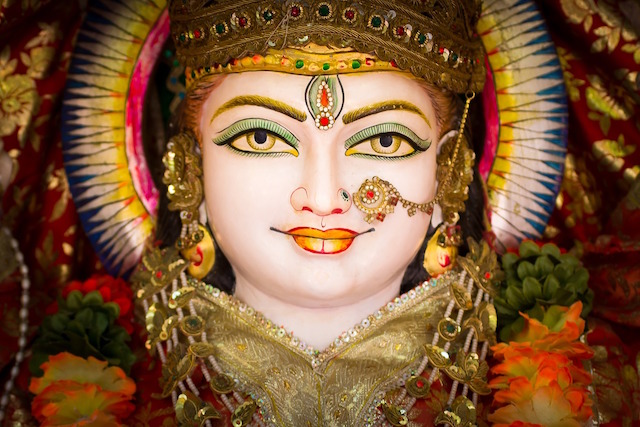
The double-wrapped red string bracelet still graces my wrist as a vivid reminder of that day.
The day I rekindled my relationship with my intuition. The day that refilled my heart with love, strength, and patience. The day that taught me these very gifts were available to me—and all of us—at all times.
I didn’t know what I was signing up for when I drove to my friend’s house in Berkeley for a Devi Puja ceremony—a Hindu goddess celebration. I walked in a little late, and noticed that people had already sat down and begun chanting. But my friend immediately came over to welcome me with a warm embrace, ushering me upstairs to her room to change into more traditional clothing for the ceremony. Modest, comfortable, and colorful was the dress code; she gave me a beautiful skirt in hues of blue that went all the way to the ground.
When I got back downstairs, I could see the vibrant golds and reds of flower petals, draped table cloths, statues, and framed pictures adorning the puja table. The smell of basmati rice mixed with incense floated in the air, and the harmonium hummed.
All of my senses were stimulated, drawing my focus to the present moment.
The ceremony began with one of the guides tying the red string, or kalava, around our wrists. In the Hindu tradition, the string represents the unity weaving us all together, specifically those around me who had gathered to honor the deities. The color red represents purity or Shakti (cosmic energy), as well as bravery, generosity, and security.
Afterward, our lead guide, Sri Vivek, explained why there are so many gods and goddesses in the Hindu tradition. Many in the West believe in a singular, omnipotent God, but we may often wonder how one being can be in so many places at once. In the polytheistic Hindu tradition, the many goddesses (and gods) are intended to make the idea of a singular, omnipotent God more accessible. These deities each have specific jobs running the various aspects of our world, just like we have earthly postal workers, teachers, civil servants, and doctors that all serve a specific function in our cities.
For instance, there is:
>> Durga, the warrior goddess who champions the victory of good over evil.
>> Lakshmi, the goddess of wealth and prosperity.
>> Saraswati, the goddess of knowledge and the arts.
With this context in mind, we proceeded to make offerings of water, light, food, and flowers to the goddesses at our sacred puja altar.
A fire roared in the room, and as we chanted to the aforementioned goddesses 108 times each, we tossed uncooked rice and sesame seeds into the roaring fire that filled the space with oppressive heat. It was hot as hell, and it made me be present for sure—I didn’t want to get burned!
In this moment, I was curious if anything mystical would happen if I stayed super focused as I repeated the goddess names over and over again. Maybe we’d see a smoke image of one of the goddesses? Maybe being hot as hell was necessary for keeping our focus on the ceremony unfolding before us?
I looked at the calm, sweating faces in the circle around the fire and wondered about what they were experiencing. The trance-like chanting of these names, combined with the heat from the fire, drew me into myself. I realized the fire before me mirrored the fire deep within me—the fire of my intuition, the voice deep within.
It can be so difficult to listen to our intuition when going about daily life. While this ceremony helped to reconnect me with mine, we don’t need a lavish ceremony to tap into it. There are two simple, related practices that can help us do this every day:
1. Meditate. Breathe through whatever thoughts come into your head. Acknowledge them and let them ride out—even if they are painful. By being with these feelings instead of pushing them away, we learn to let them go. In doing this, we free ourselves from the possibility that those feelings will arise in another way in the future, which they almost certainly will if we continue to carry them around like a bag of rocks. And if we feel that we’re too busy to meditate, we can practice this at a red light in the car, in the shower, or on a walk in the woods. Simply turn your attention to the breath, and gently return to it if you notice it stray.
2. Accept change. All feelings are temporary. Repeating this truth over and over can help us to get comfortable with change, which is the only constant, after all. This too shall pass. As we accept the reality of the present moment, fear leaves and discernment arrives. We connect with our deep inner knowing that guides us forward.
“Your mind will answer most questions if you learn to relax and wait for the answer.” ~ William S. Burroughs
After we completed the fire ceremony of chanting the goddess names, we shared a delicious, vegetarian Indian meal sitting on pillows in a circle. We quietly reflected upon our experiences and appreciated the physical and spiritual nourishment before us.
In the wake of this intense ceremony, each goddess felt like a literal and specific someone to call upon, to guide me for the days that followed. Visualizing, honoring, and chanting their names connected me to my intuition once again, and I walked away with the red string on my wrist as a reminder to trust it in the days to come.
Perhaps now I am ready to take the red string off my wrist and face the heat of life without its physical reminder. After all, I have the goddesses by my side, and innate wisdom deep within me.
~
~
Author: Shelley Karpaty
Image: MaxPixel
Editor: Callie Rushton
Copy Editor: Travis May
Social Editor: Waylon Lewis


 Share on bsky
Share on bsky




Read 0 comments and reply